Ditapis dengan

KAMUS Sanskrit - Inggris - Indonesia
Kamus tiga-bahasa yang penting untuk memahami istilah-istilah teknis keagamaan Buddha. Dalam kamus ini, kata-kata Sanskerta ditulis dalam akasara aslinya, bukan dalam aksara Latin. Lebih dari itu, kamus ini memberikan kita daftar kata-kata Sanskerta memberi perluasan terhadap bahasa Indonesia. Penting bukan hanya untuk pembelajar agama Buddha, tetapi para pemerhati bahasa, terutama mereka yang …
- Edisi
- -
- ISBN/ISSN
- 9786029576207
- Deskripsi Fisik
- 221 hlm, 21.5 cm
- Judul Seri
- -
- No. Panggil
- 423 Wil k
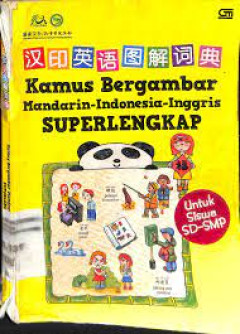
Kamus Bergambar : Mandarin-Indonesia-inggris
- Edisi
- -
- ISBN/ISSN
- 9786020315829
- Deskripsi Fisik
- 377 hlm ; ilus ; 28 hlm
- Judul Seri
- -
- No. Panggil
- 413.17 Ning k
- Edisi
- -
- ISBN/ISSN
- 9786020315829
- Deskripsi Fisik
- 377 hlm ; ilus ; 28 hlm
- Judul Seri
- -
- No. Panggil
- 413.17 Ning k
Kamus INGGRIS - INDONESIA - TIONGHOA
- Edisi
- -
- ISBN/ISSN
- 9789796863990
- Deskripsi Fisik
- 419 hlm, 25 cm
- Judul Seri
- -
- No. Panggil
- 423 Wil k
- Edisi
- -
- ISBN/ISSN
- 9789796863990
- Deskripsi Fisik
- 419 hlm, 25 cm
- Judul Seri
- -
- No. Panggil
- 423 Wil k
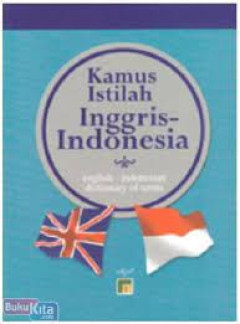
Kamus Istilah Inggris indonesia
Kamus ini memuat istilah yang kerapkali muncul dalam berbagai disiplin ilmu. Pemahaman kosakata yang luas dalam beragam ranah tersebut akan menjadi energi yang kuat dalam menyangga kelancaran arus komunikasi dalam bahasa inggris dengan efektif baik secara lisan maupun tulisan. agriculture, animal, audio, biology, bird, chemistry, color, company, construction, crime, dining room,drink,economy…
- Edisi
- 1
- ISBN/ISSN
- 9789791300148
- Deskripsi Fisik
- iv,201 hlm 16 cm
- Judul Seri
- -
- No. Panggil
- 423 zal k
KAMUS LENGKAP INGGRIS INDONESIA
- Edisi
- -
- ISBN/ISSN
- 2660
- Deskripsi Fisik
- 703 hlm, 20 cm
- Judul Seri
- -
- No. Panggil
- 423 san k
- Edisi
- -
- ISBN/ISSN
- 2660
- Deskripsi Fisik
- 703 hlm, 20 cm
- Judul Seri
- -
- No. Panggil
- 423 san k
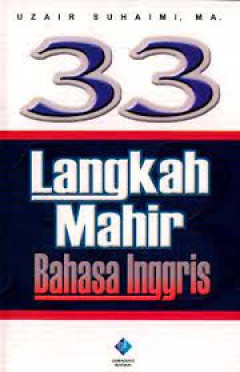
Langkah Mahir Bahasa Inggris
- Edisi
- -
- ISBN/ISSN
- 9799773598
- Deskripsi Fisik
- xiii
- Judul Seri
- -
- No. Panggil
- 425 SUH t1
- Edisi
- -
- ISBN/ISSN
- 9799773598
- Deskripsi Fisik
- xiii
- Judul Seri
- -
- No. Panggil
- 425 SUH t1
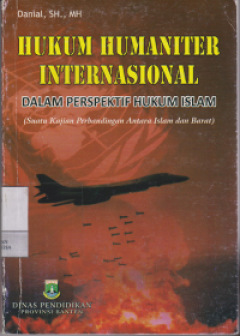
Hukum Humaniter Internasional Dalam Perspektif Hukum Islam (Suatu Kajian Perb…
- Edisi
- -
- ISBN/ISSN
- 9786029004137
- Deskripsi Fisik
- xi, 276 hlm, 20 cm
- Judul Seri
- -
- No. Panggil
- 4.7 Dan h
- Edisi
- -
- ISBN/ISSN
- 9786029004137
- Deskripsi Fisik
- xi, 276 hlm, 20 cm
- Judul Seri
- -
- No. Panggil
- 4.7 Dan h
Kamus Pasar Modal
- Edisi
- -
- ISBN/ISSN
- -
- Deskripsi Fisik
- 393 hlm, 22 cm
- Judul Seri
- -
- No. Panggil
- 403 Ard k
- Edisi
- -
- ISBN/ISSN
- -
- Deskripsi Fisik
- 393 hlm, 22 cm
- Judul Seri
- -
- No. Panggil
- 403 Ard k
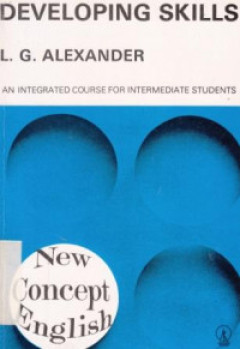
Developing Skills
- Edisi
- 14
- ISBN/ISSN
- 9794133078
- Deskripsi Fisik
- xv, 145 hlm, 22 cm
- Judul Seri
- -
- No. Panggil
- 420 Ale d
- Edisi
- 14
- ISBN/ISSN
- 9794133078
- Deskripsi Fisik
- xv, 145 hlm, 22 cm
- Judul Seri
- -
- No. Panggil
- 420 Ale d
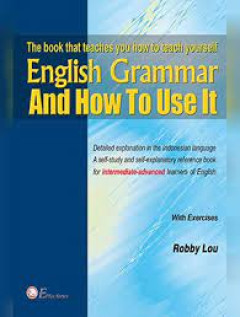
The Book That Teaches You How To teach Youself English Grammar And How To Use It
- Edisi
- -
- ISBN/ISSN
- 9799880629
- Deskripsi Fisik
- viii, 254 hlm, 26 cm
- Judul Seri
- -
- No. Panggil
- 423 Rob t
- Edisi
- -
- ISBN/ISSN
- 9799880629
- Deskripsi Fisik
- viii, 254 hlm, 26 cm
- Judul Seri
- -
- No. Panggil
- 423 Rob t
Fun With: High Frequency Words
- Edisi
- -
- ISBN/ISSN
- 9789791887601
- Deskripsi Fisik
- vi, 68 hlm, 19 cm
- Judul Seri
- -
- No. Panggil
- 401.4 han h
- Edisi
- -
- ISBN/ISSN
- 9789791887601
- Deskripsi Fisik
- vi, 68 hlm, 19 cm
- Judul Seri
- -
- No. Panggil
- 401.4 han h
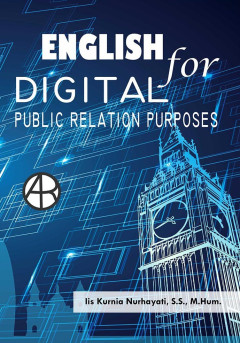
English for Digital Public Relations Purposes
Buku ini terdiri dari beberapa bab. Meeting 1. Is a pr for you?, meeting 2.what is digital pr ?, meeting 3.traditional pr vs digital pr, meeting 4.social media and digital pr, and meeting 5.social media as public relations channel. Meeting 6.twitterfor public relations, meeting 7.facebook and public relations, meeting 8.digital pr lesson for crisis, meeting 9.digital pr content, meeting 10.m…
- Edisi
- 1
- ISBN/ISSN
- 9786024535773
- Deskripsi Fisik
- x, 207 hlm ; 25 cm
- Judul Seri
- -
- No. Panggil
- 420 Nur e
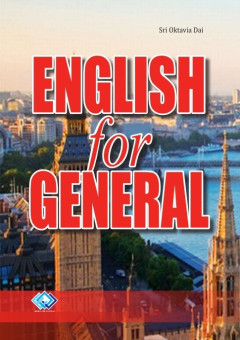
English for General
- Edisi
- -
- ISBN/ISSN
- 9786239947736
- Deskripsi Fisik
- x, 88 hlm; 23 cm
- Judul Seri
- -
- No. Panggil
- 428 Dai e
- Edisi
- -
- ISBN/ISSN
- 9786239947736
- Deskripsi Fisik
- x, 88 hlm; 23 cm
- Judul Seri
- -
- No. Panggil
- 428 Dai e

Reading for General Communications: For the first semester students at tertia…
- Edisi
- cet 1
- ISBN/ISSN
- 9786239974800
- Deskripsi Fisik
- viii, 136 hlm; Ilus; 23 cm
- Judul Seri
- -
- No. Panggil
- 421.55 Ind r
- Edisi
- cet 1
- ISBN/ISSN
- 9786239974800
- Deskripsi Fisik
- viii, 136 hlm; Ilus; 23 cm
- Judul Seri
- -
- No. Panggil
- 421.55 Ind r
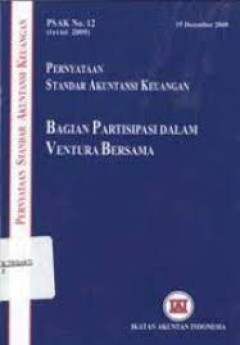
computer assisted language learning and testing
- Edisi
- -
- ISBN/ISSN
- 0066326192
- Deskripsi Fisik
- -
- Judul Seri
- -
- No. Panggil
- 420.07 Dun c
- Edisi
- -
- ISBN/ISSN
- 0066326192
- Deskripsi Fisik
- -
- Judul Seri
- -
- No. Panggil
- 420.07 Dun c
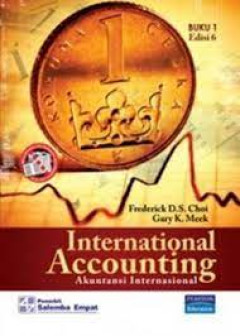
Colaborative Learning
- Edisi
- -
- ISBN/ISSN
- 9791305419
- Deskripsi Fisik
- xii, 196 hlm, 21.5 cm
- Judul Seri
- -
- No. Panggil
- 428 Joh c
- Edisi
- -
- ISBN/ISSN
- 9791305419
- Deskripsi Fisik
- xii, 196 hlm, 21.5 cm
- Judul Seri
- -
- No. Panggil
- 428 Joh c
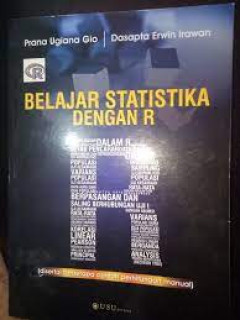
Semiotika Dalam Riset Komunikasi
Studi tentang tanda dan makna tanda, demikian pengertian sederhana dari semiotika. Manusia dalam kehidupannya selalu dikelilingi oleh tanda-tanda. Keunikan manusia yang membedakannya dengan mahluk lain adalah selain menciptakan tanda-tanda, manusia juga menginterpretasikan atau memberi makna pada tanda-tanda tersebut. Dalam kehidupan sehari-hari kita sering berjumpa dengan tanda dan secara otom…
- Edisi
- 1
- ISBN/ISSN
- 9786233726450
- Deskripsi Fisik
- xx, 224hlm;, 23cm
- Judul Seri
- -
- No. Panggil
- 400 Ver s
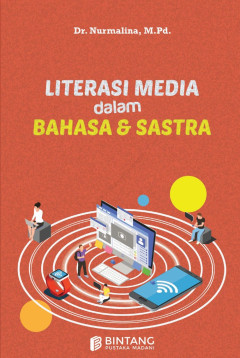
Literasi Media dalam Bahasa Sastra
Buku menulis ini dimaksudkan sebagai bahan panduan dalam penulisan buku mata pelajaran Bahasa Literasi Media dalam Bahasa dan Sastra Indonesia di Sekolah Menengah Atas/Kejuruan.
- Edisi
- ix, 86 hlm; Ilus; 23 cm
- ISBN/ISSN
- 9786236786536
- Deskripsi Fisik
- ix, 86 hlm; Ilus; 23 cm
- Judul Seri
- -
- No. Panggil
- 400 Nur l
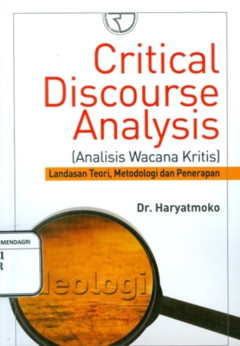
Critical Discourse Analysis [Analisis Wacana Kritis]: Landasan Teori, Metodol…
pakah yang dimaksud dengan Critical Discourse Analysis (CDA) atau Analisis Wacana Kritis (AWK) itu? Bagaimanakah sejarah kemunculannya dan mengapa ia penting dipelajari saat ini? Siapa sajakah tokohnya dan siapa pula yang memengaruhi pemikiran mereka? Dimana letak kekhasan CDA/AWK dibanding dengan pendekatan lain dalam kajian ilmu sosial-humaniora? Apakah orientasi pendekatan CDA/AWK dan bagaim…
- Edisi
- 1
- ISBN/ISSN
- 9786024250737
- Deskripsi Fisik
- xiv, 270 hlm ; 23 cm
- Judul Seri
- -
- No. Panggil
- 401.41 Har c
Kamus Istilah Manajemen
- Edisi
- -
- ISBN/ISSN
- 9794410246
- Deskripsi Fisik
- xviii, 321 hlm; 24 cm
- Judul Seri
- -
- No. Panggil
- 403.1 Ppm k
- Edisi
- -
- ISBN/ISSN
- 9794410246
- Deskripsi Fisik
- xviii, 321 hlm; 24 cm
- Judul Seri
- -
- No. Panggil
- 403.1 Ppm k
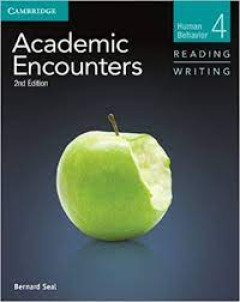
Academic Ecounters Human Behaviour 4 Reading and Writing
- Edisi
- -
- ISBN/ISSN
- 9781107602977
- Deskripsi Fisik
- xvi, 216 hlm, ilus, 25 cm
- Judul Seri
- -
- No. Panggil
- 421.55 Sea a
- Edisi
- -
- ISBN/ISSN
- 9781107602977
- Deskripsi Fisik
- xvi, 216 hlm, ilus, 25 cm
- Judul Seri
- -
- No. Panggil
- 421.55 Sea a
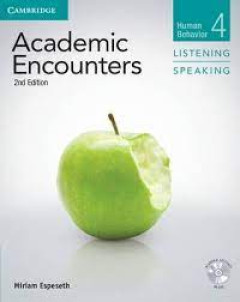
Academic Ecounters Human Behavior 4 Listening and Speaking
- Edisi
- -
- ISBN/ISSN
- 9781107602984
- Deskripsi Fisik
- xvi, 184 hlm, ilus, 25 cm
- Judul Seri
- -
- No. Panggil
- 428 Esp a
- Edisi
- -
- ISBN/ISSN
- 9781107602984
- Deskripsi Fisik
- xvi, 184 hlm, ilus, 25 cm
- Judul Seri
- -
- No. Panggil
- 428 Esp a
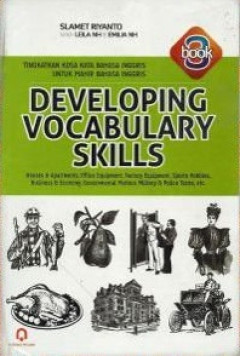
Developing Vocabulary Skills
- Edisi
- -
- ISBN/ISSN
- 9786028479677
- Deskripsi Fisik
- viii, 295 hlm, 21 cm
- Judul Seri
- -
- No. Panggil
- 401.4 Riy d
- Edisi
- -
- ISBN/ISSN
- 9786028479677
- Deskripsi Fisik
- viii, 295 hlm, 21 cm
- Judul Seri
- -
- No. Panggil
- 401.4 Riy d
A Textbook of Translation
This major new work by Professor Newmark is a textbook and a handbook of translation for English and foreign students working alone or on courses at degree and post-graduate level. Part one consists of a comprehensive discussion of most subjects and problems that arise in translating: the process of translating, text analysis, translation methods, text as a translation unit, translation procedu…
- Edisi
- -
- ISBN/ISSN
- 0139125930
- Deskripsi Fisik
- xii, 292 hlm; 23 cm
- Judul Seri
- -
- No. Panggil
- 418.02 New a
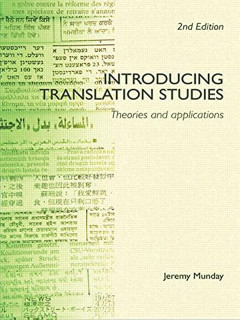
Introducing Translation Studies Theories and Application
This introductory textbook provides an accessible overview of the key contributions to translation theory. Jeremy Munday explores each theory chapter-by-chapter and tests the different approaches by applying them to texts. The texts discussed are taken from a broad range of languages – English, French, German, Spanish, Italian, Punjabi, Portuguese and English translations are provided. A wid…
- Edisi
- -
- ISBN/ISSN
- 9780415229272
- Deskripsi Fisik
- xiv, 222 hlm:Ilus: 25 cm
- Judul Seri
- -
- No. Panggil
- 418.02 Mun i
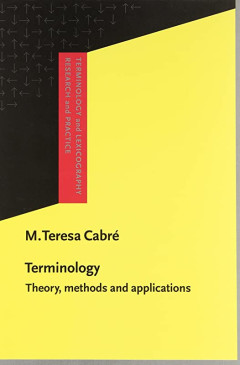
Terminology And Lexicography Research And Practice: Theory, Methods and Appli…
Terminology: Theory, methods and applications addresses language specialists, terminologists, and all those who take an interest in socio-political and technical aspects of Terminology. The book covers its subject comprehensively and deals among other things with concepts (the relation between linguistics, cognitive science, communication studies, documentation and computer science); Methodolog…
- Edisi
- -
- ISBN/ISSN
- 9027216339
- Deskripsi Fisik
- xii, 247 hlm; Ilus; 23 cm
- Judul Seri
- -
- No. Panggil
- 420 Cab t
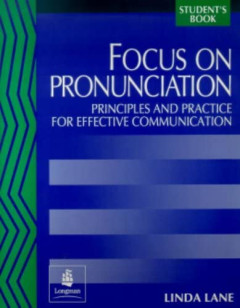
Focus on Pronunciation Principles and Practice for Effective Communication St…
Advanced Level. Focus on Pronunciation, a comprehensive pronunciation course, is designed to help students enjoy speaking English well. Written for advanced ESL students, Focus on Pronunciation addresses the crux of most pronunciation problems by emphasizing elements of English phonology that are difficult or unusual in terms of the world's languages.
- Edisi
- -
- ISBN/ISSN
- 9780201592849
- Deskripsi Fisik
- xii, 228 hlm; Ilus; 28 cm
- Judul Seri
- -
- No. Panggil
- 420 Lan f
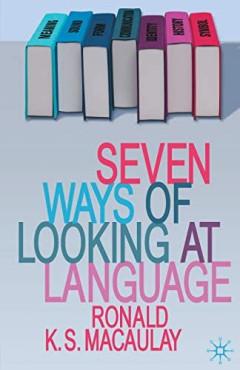
Seven Ways of Looking at Language
From the publication of Noam Chomsky's revolutionary Syntactic Structures in 1957, to the counter-revolutions that followed, linguistics has seen many fashions over the years. With new ideas and discoveries constantly challenging the ways we look at language, Ronald Macaulay provides a brief and lively introduction to some of the different approaches linguists have taken to the study of languag…
- Edisi
- 1
- ISBN/ISSN
- 9780230279315
- Deskripsi Fisik
- xiv, 199 hlm; Ilus; 22 cm
- Judul Seri
- -
- No. Panggil
- 420 Mac s
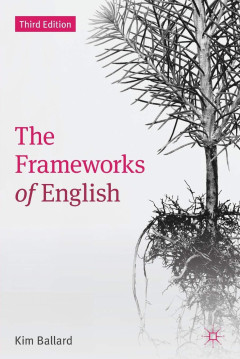
The Frameworks of English Third Edition
How does language work? What are the different elements? How do they all fit together? The Frameworks of English is a step-by-step guide through the various levels of language, describing the morphological, lexical, grammatical and phonological frameworks of contemporary English in a clear and logical way. Beginning with words as the building blocks of language, it investigates their interna…
- Edisi
- 3
- ISBN/ISSN
- 9780230392427
- Deskripsi Fisik
- xvi, 397 hlm; Ilus; 24 cm
- Judul Seri
- -
- No. Panggil
- 420 Bal t
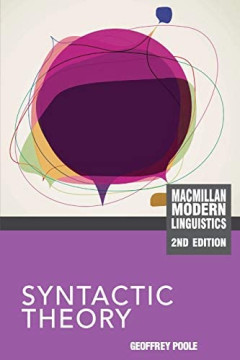
Syntactic Theory Second Edition
This is a highly recommendable book. It elegantly introduces generative grammar as an empirical science. Written in a clear and friendly tone, it is extremely readable and makes complicated linguistic theory accessible to students' - Ken Ramshøj Christensen, Aarhus University, Denmark This clear and practical introduction to Syntactic Theory introduces students to theory building, hypothesi…
- Edisi
- 2
- ISBN/ISSN
- 9780230243941
- Deskripsi Fisik
- xiv, 344 hlm; Ilus; 24 cm
- Judul Seri
- -
- No. Panggil
- 415 Poo s
 Karya Umum
Karya Umum  Filsafat
Filsafat  Agama
Agama  Ilmu-ilmu Sosial
Ilmu-ilmu Sosial  Bahasa
Bahasa  Ilmu-ilmu Murni
Ilmu-ilmu Murni  Ilmu-ilmu Terapan
Ilmu-ilmu Terapan  Kesenian, Hiburan, dan Olahraga
Kesenian, Hiburan, dan Olahraga  Kesusastraan
Kesusastraan  Geografi dan Sejarah
Geografi dan Sejarah